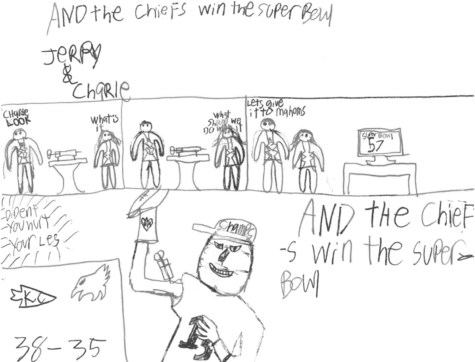DDF: Sport or Activity?
Though many members of the Dimond Drama, Debate and Forensics team are rookies, every single one of them came home with an award after the tournament at West High School Sept. 9.
DDF is listed on the sports and activities page on the Anchorage School District website, but there is some debate amongst the student population on whether DDF is officially considered a sport or an activity.
When asked what coaching DDF is like, the new Dimond coach, Adrian Schnyder, took a moment to gather his thoughts.
“It’s been wild. It’s been really, really fast, with a lot to do,” he said. “Trying to get a team going in 10 days is really tough, especially with the meet so early in the season.”
This is something that many people do not know about DDF: there is a required number of practices that team members must attend before being allowed to compete at a tournament.
This is just one of the major misunderstandings that take place amongst the student population in regards to DDF.
“Well, first of all, I just don’t think many people know that it exists,” Schnyder said. “It’s not well represented, and even if people do know what it is, they’ve never been to a meet, they’ve never seen what it’s like, and they’ve never tried to do it.
“It’s hard to understand something that you have no experience with,” he concluded, summing up what many of the team members also said when asked about DDF.
Other team coaches are in agreement with Schnyder.
Amy Utley, the drama coach for the South team, said, “I think nobody cares what DDF is, except for people in DDF.
“I think it’s because it’s not something that you can just go and watch the same way you can watch a sport, because there’s no shouting and clapping and running around and getting food,” she finished, raising a pertinent point about the accessibility of the competitions.
Each event is separated into rounds, and each round is in a room that usually contains the other competitors and a single judge.
If there are any observers, it usually consists of other members of DDF.
This is another aspect that puts a strike against the idea of DDF being a sport: there is no stereotypical physical exertion.
For some, this is a huge issue, but Schnyder has a response to this.
“It’s a competitive event, it focuses on training and practice in the same way that any sport does, and it emphasizes physical and mental strength and preparedness.”
As he spoke, he ticked off the points on his fingers.
“That’s pretty much a sport.”
The Dimond team captain, Winnie Combs, a senior, is in agreement.
“We have formal competitions where many teams get together and it’s incredibly vigorous. It’s incredibly straining on both your mind and body,” Combs said, thinking back on former competitions that she has competed in.
At this last tournament, Combs placed third in Lincoln-Douglas debate, third in Humorous Interpretation and fourth in Foreign Extemporaneous speaking.
“The competitiveness of the entire tournament qualifies it as a sport.” Combs asserted, speaking the same opinion that nearly everyone involved in DDF has.
For most involved, they simply want the recognition that what they do is serious.
Utley said, “I feel that both sports and activities that are competitive the way DDF is competitive— like a sport— should be given the same amount of attention and prestige as something like, say, football.”
Both Schnyder and Combs agree with this, but only time will tell if any actions are taken to give DDF more attention as a legitimate sport.

